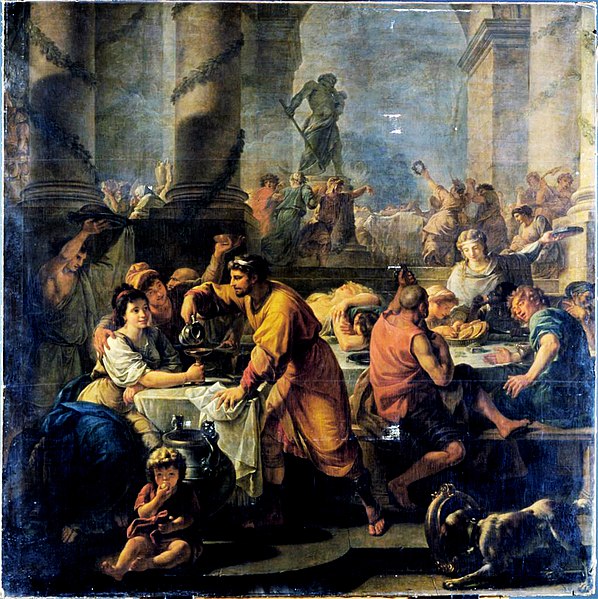Hello ladies and gents this is the Viking telling you that today we are talking about
Saturnalia
Saturnalia was an ancient Roman festival and holiday in honour of the god Saturn, held on 17 December of the Julian calendar and later expanded with festivities through to 23 December. The holiday was celebrated with a sacrifice at the Temple of Saturn, in the Roman Forum, and a public banquet, followed by private gift-giving, continual partying, and a carnival atmosphere that overturned Roman social norms: gambling was permitted, and masters provided table service for their slaves as it was seen as a time of liberty for both slaves and freedmen alike.
A common custom was the election of a "King of the Saturnalia", who would give orders to people, which were to be followed and preside over the merrymaking. The gifts exchanged were usually gag gifts or small figurines made of wax or pottery known as sigillaria. The poet Catullus called it "the best of days".
Saturnalia was the Roman equivalent to the earlier Greek holiday of Kronia, which was celebrated during the Attic month of Hekatombaion in late midsummer. It held theological importance for some Romans, who saw it as a restoration of the ancient Golden Age, when the world was ruled by Saturn. The Neoplatonist philosopher Porphyry interpreted the freedom associated with Saturnalia as symbolizing the "freeing of souls into immortality".
Saturnalia may have influenced some of the customs associated with later celebrations in western Europe occurring in midwinter, particularly traditions associated with Christmas, the Feast of the Holy Innocents, and Epiphany. In particular, the historical western European Christmas custom of electing a "Lord of Misrule" may have its roots in Saturnalia celebrations.
In Roman mythology, Saturn was an agricultural deity who was said to have reigned over the world in the Golden Age, when humans enjoyed the spontaneous bounty of the earth without labour in a state of innocence. The revelries of Saturnalia were supposed to reflect the conditions of the lost mythical age. The Greek equivalent was the Kronia, which was celebrated on the twelfth day of the month of Hekatombaion, which occurred from around mid-July to mid-August on the Attic calendar.
The Greek writer Athenaeus also cites numerous other examples of similar festivals celebrated throughout the Greco-Roman world, including the Cretan festival of Hermaia in honor of Hermes, an unnamed festival from Troezen in honor of Poseidon, the Thessalian festival of Peloria in honor of Zeus Pelorios, and an unnamed festival from Babylon.
He also mentions that the custom of masters dining with their slaves was associated with the Athenian festival of Anthesteria and the Spartan festival of Hyacinthia. The Argive festival of Hybristica, though not directly related to the Saturnalia, involved a similar reversal of roles in which women would dress as men and men would dress as women.
The ancient Roman historian Justinus credits Saturn with being a historical king of the pre-Roman inhabitants of Italy:
The first inhabitants of Italy were the Aborigines, whose king, Saturnus, is said to have been a man of such extraordinary justice, that no one was a slave in his reign, or had any private property, but all things were common to all, and undivided, as one estate for the use of every one; in memory of which way of life, it has been ordered that at the Saturnalia slaves should everywhere sit down with their masters at the entertainments, the rank of all being made equal."
— Justinus, Epitome of Pompeius Trogus 43.3
Although probably the best-known Roman holiday, Saturnalia as a whole is not described from beginning to end in any single ancient source. Modern understanding of the festival is pieced together from several accounts dealing with various aspects. The Saturnalia was the dramatic setting of the multivolume work of that name by Macrobius, a Latin writer from late antiquity who is the major source for information about the holiday.
Macrobius describes the reign of Justinus' "king Saturn" as "a time of great happiness, both on account of the universal plenty that prevailed and because as yet there was no division into bond and free – as one may gather from the complete license enjoyed by slaves at the Saturnalia." In Lucian's Saturnalia it is Chronos himself who proclaims a "festive season, when 'tis lawful to be drunken, and slaves have license to revile their lords".
In one of the interpretations in Macrobius's work, Saturnalia is a festival of light leading to the winter solstice, with the abundant presence of candles symbolizing the quest for knowledge and truth. The renewal of light and the coming of the new year was celebrated in the later Roman Empire at the Dies Natalis Solis Invicti, the "Birthday of the Unconquerable Sun", on 23 December.
The popularity of Saturnalia continued into the 3rd and 4th centuries AD, and as the Roman Empire came under Christian rule, many of its customs were recast into or at least influenced the seasonal celebrations surrounding Christmas and the New Year.

Comments
Post a Comment